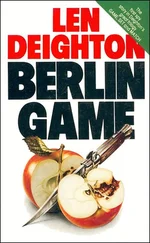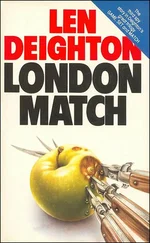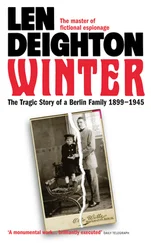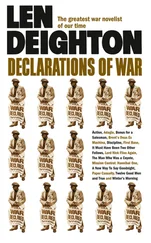Len Deighton - XPD
Здесь есть возможность читать онлайн «Len Deighton - XPD» — ознакомительный отрывок электронной книги совершенно бесплатно, а после прочтения отрывка купить полную версию. В некоторых случаях можно слушать аудио, скачать через торрент в формате fb2 и присутствует краткое содержание. Жанр: Триллер, на английском языке. Описание произведения, (предисловие) а так же отзывы посетителей доступны на портале библиотеки ЛибКат.
- Название:XPD
- Автор:
- Жанр:
- Год:неизвестен
- ISBN:нет данных
- Рейтинг книги:4 / 5. Голосов: 1
-
Избранное:Добавить в избранное
- Отзывы:
-
Ваша оценка:
- 80
- 1
- 2
- 3
- 4
- 5
XPD: краткое содержание, описание и аннотация
Предлагаем к чтению аннотацию, описание, краткое содержание или предисловие (зависит от того, что написал сам автор книги «XPD»). Если вы не нашли необходимую информацию о книге — напишите в комментариях, мы постараемся отыскать её.
XPD — читать онлайн ознакомительный отрывок
Ниже представлен текст книги, разбитый по страницам. Система сохранения места последней прочитанной страницы, позволяет с удобством читать онлайн бесплатно книгу «XPD», без необходимости каждый раз заново искать на чём Вы остановились. Поставьте закладку, и сможете в любой момент перейти на страницу, на которой закончили чтение.
Интервал:
Закладка:
None of Churchill’s visits in May provided any chance for him to confer with German plenipotentiaries, let alone with Hitler himself. But Churchill’s next visit to France on June 11 and 12 was curious in every way. Even though German spearheads were at the gates of Paris, and were to occupy the city three days later, Churchill’s private aircraft flew beyond the German columns, to land at a very small airfield near the little country town of Briare. In Vol. 2 of his memoirs, Churchill admitted that the rendezvous was not fixed until the day of departure. This was because he was waiting for a message from Adolf Hitler, sent to London through the Spanish embassy.
The clue to Winston Churchill’s secret onward flight was contained in the fact that the British Prime Minister did not remain with the others of the British contingent. General Dill, General Ismay, Anthony Eden, the Foreign Minister, and even Churchill’s translator were all accommodated in a nearby military train. As soon as the aircraft landed, Churchill departed again unaccompanied.
Boyd Stuart turned again to the memoirs of Sir Edward Spears [2]-no one had been closer to Churchill during those terrible days. Of the morning of June 12, 1940. which followed that night spent in France with the German armies racing ever closer, Spears wrote, ‘I did not look up for a while, and when I did I was astonished to see the Prime Minister’s detective, Thompson.’ Thompson was a permanent feature of the Churchill household and had been for many years. It was amazing that he should be separated from the man he protected. Spears continues, ‘Surprised into tactlessness I said, “Why Thompson, what are you doing here? Why aren’t you with the Prime Minister? Surely he will need you?”
‘ “I had to sleep here, and the French failed to realize I needed a car.” ’
So that was it. Not even Winston Churchill’s own bodyguard had stayed with him. Was that a condition that Adolf Hitler had imposed, or had Churchill decided that his secret flight must put no one to hazard but himself?
For by that time, on June 14, 1940, Winston Churchill was alone, far away from his staff, his interpreter, his bodyguard and his advisers. He had already had two long sessions with Adolf Hitler.
If Churchill’s movements were significant, then Hitler’s were even more so. On June 6, 1940, after frantic construction work carried out at short notice, a secret meeting-place had been improvised in Belgium at the tiny frontier zone village of Brûly de Pesche. The air-raid shelter there was still damp from freshly poured concrete and Hitler refused to go inside it. Here the airstrip was no more than a meadow big enough to land a small communications aircraft, so Churchill’s twin engined de Havilland Flamingo had landed near to Hitler’s Junkers at Rocroi, just across the border in France. The Fieseler Storch was already warmed-up when Churchill landed, and by the time the little plane was airborne Churchill’s Flamingo was shrouded in camouflage nets on the far side of the airfield.
Significant too was the fact that the Brûly de Pesche headquarters was used once only, for this meeting with Winston Churchill. The whole elaborate place was constructed solely for this secret summit meeting and after its few days of importance was left to rot.
On June 17, his hopes of a British request for a ceasefire faded, Adolf Hitler travelled to Munich where, in the Prince Carl Palace, Benito Mussolini was hoping to hear that the British would no longer resist his armies in Africa. By June 21 the fighting in France was all but finished. Hitler was motoring through the Forest of Compiègne in his open Mercedes, arranging that the German army engineers bring out of its museum the railway coach in which the Germans had signed a peace with France after the First World War. On June 22 the French armistice was signed in that same Pullman car. The brief chance of early peace between Britain and Germany had gone for ever.
Stuart went through the papers again and again. He looked at the Waffen SS and army unit war diaries that the War Office had provided from their archives. He looked at the tall stack of biographies that described Adolf Hitler’s life in such minute detail. He looked at xerox copies from the Berlin document centre and the West German archives. He looked once more at the published memoirs. Once the truth was known, so many other mysteries were solved. For instance, why had the twelve Hawker Hurricanes that escorted Churchill’s aircraft out of Briare on June 11 not been sent out to escort him for the return flight the next day? [3]It was especially puzzling in the light of the RAF’s order of battle, which showed that six Hurricane squadrons were based in France until June 17. The fighters would not even have had to cross the Channel to get to Briare.
The real answer was obvious now, but the official reason had been given as bad weather. (It hardly fitted with the fact that on this same day RAF aircraft had found the weather and visibility good enough to make low-level bombing attacks on bridges over the Albert Canal in nearby Belgium, to say nothing of long-range bombers flying from England to Turin.) The fact was that the Hawker Hurricane pilots might, by some error or disruption of the schedule, have glimpsed the unthinkable.
They would have seen a Staffel of Messerschmitt Bf 109 Es flying close escort on Churchill’s unarmed Flamingo. The aircraft, from Jagdgeschwader 51, had been ordered to this task by direct order to Luftflotte 2 headquarters from the Führerhauptquartier. These German fighters circled the airfield until Churchill’s aircraft was in the air, and then protected him across the German lines into French airspace.
Significantly, it was the Luftwaffe high command in Berlin (Ob.d.L.) which had issued the special instructions for this small tactical mission. Stuart turned the teleprinter message over in his hands. The cryptic language of the signals unit at Luftflotte 2, which passed the secret message to IX Fliegerdivision HQ, did little to hide the nature of the instruction. No routing was mentioned in the message but HQ insisted that all pilots must be specially briefed that the Sonderflug must be kept safe at all costs. No fighter pilot must leave the escort formation to attack enemy targets no matter how tempting. The Geschwaderkommodore, the message continued, was to lead the mission in person. Failure to carry out the terms of this ‘commander-in-chief’s order’ would mean court-martial for all concerned.
Adolf Hitler had done everything in his power to ensure that no ghastly calamity mar this chance of the British Commonwealth’s giving up the struggle so that he could become the undisputed master of Europe.
Boyd Stuart closed the file, and pressed the buzzer to summon the duty archive clerk. Suddenly he felt tired and rather old.
36
There were plenty of larger boats to be seen on Lake Geneva that summer but Die Zitrone was a fifty-foot motor yacht with factory-fresh diesels, modern radar and a powerful launch swinging from the stern davits. Die Zitrone cruised very slowly along the south side of the lake, keeping close to the shore, but not dangerously so. On the afterdeck two men were seated at a table with a Campari in one hand and Zeiss binoculars in the other. From time to time they would raise the binoculars to look at the shoreline.
It was a warm day, the first Saturday of August. One of the men was dressed in dark trousers and a white shirt with a neat monogram on the pocket flap-as used to mark expensive made-to-measure garments. A blue yachting cap completed the sort of informal outfit favoured by owners who chartered and sailed their own yachts for their clients and was calculated to indicate superior skills while maintaining social equality.
Читать дальшеИнтервал:
Закладка:
Похожие книги на «XPD»
Представляем Вашему вниманию похожие книги на «XPD» списком для выбора. Мы отобрали схожую по названию и смыслу литературу в надежде предоставить читателям больше вариантов отыскать новые, интересные, ещё непрочитанные произведения.
Обсуждение, отзывы о книге «XPD» и просто собственные мнения читателей. Оставьте ваши комментарии, напишите, что Вы думаете о произведении, его смысле или главных героях. Укажите что конкретно понравилось, а что нет, и почему Вы так считаете.












